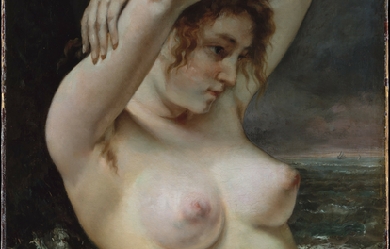
Sonnet XXXIII: Full many a Glorious Morning have I Seen
by Sophia Brookshire
William Shakespeare's "Sonnets 33" is the first of the estrangement sonnets. The narrator has been rejected by his beloved (an anonymous young man) in some way, and is using the disappearance of the sun as a metaphor for expressing his pain. The poem follows the conventional English sonnet format. The sun and the beloved are one in the same in this poem.
Stanza one begins with the image of the "sovereign eye" rising and casting its rays upon the mountain tops, flattering them. "Sovereign" is defined as someone or something that has supreme power or authority. The "eye" is a commonly associated with the sun; in fact, "the sun is understood to be an all-seeing eye" (Biedermann 122). Taking these two definitions we are led to believe that the sun is an all-powerful entity that sees and touches everything. The sun is personified (the attribution of human qualities on nonhuman forces or objects) in this poem. The "golden face" (the sun's rays) kisses the meadows making them brilliantly green. "Gilding" is defined as giving an attractive but often deceptive appearance to something. The sun makes the streams glow and glitter with its radiance. "Alchemy" is the medieval chemistry that is chiefly concerned with the efforts to turn base medals into gold. Therefore, the stream begins plain and base, but once the sun shines on it the stream appears golden. The stream metaphor alludes to the narrator's beloved's appearance being deceptive; he may be beautiful, but there is something pale and base just under the surface. This also reminds me of new love, in the beginning everything is rosy, unattractive qualities are overlooked because you are so enamored with the other, but that fades and you suddenly realize that they are not as perfect as you once thought they were.
But soon the "sovereign eye" allows the "basest" (darkest) clouds to mask his "celestial" (heavenly or divine) face rendering the world sad. The "clouds" are a metaphor for the beloved's indignity. His visage is hidden from us in the west (where the sun sets). The beloved was once bathed in the rays of the "sovereign eye," but now that his true nature is know, his visage has grown dark with "disgrace" (shame or dishonor).
Stanza three is a turning point for the narrator. Even though his beloved has betrayed him it doesn't take away the fact that his beloved's beauty shone brilliantly upon his brow one morning. The narrator decides to hold onto that one hour of splendor when his beloved was perfect and only belonged to him.
The rhyming couplet is a return to the narrator's previous devotion. The narrator's love thinks no less of his beloved for his betrayal; his love is unfaltering. The narrator concludes that if the sun can be darkened by the "basest clouds," then his beloved should be allowed to make a mistake.




